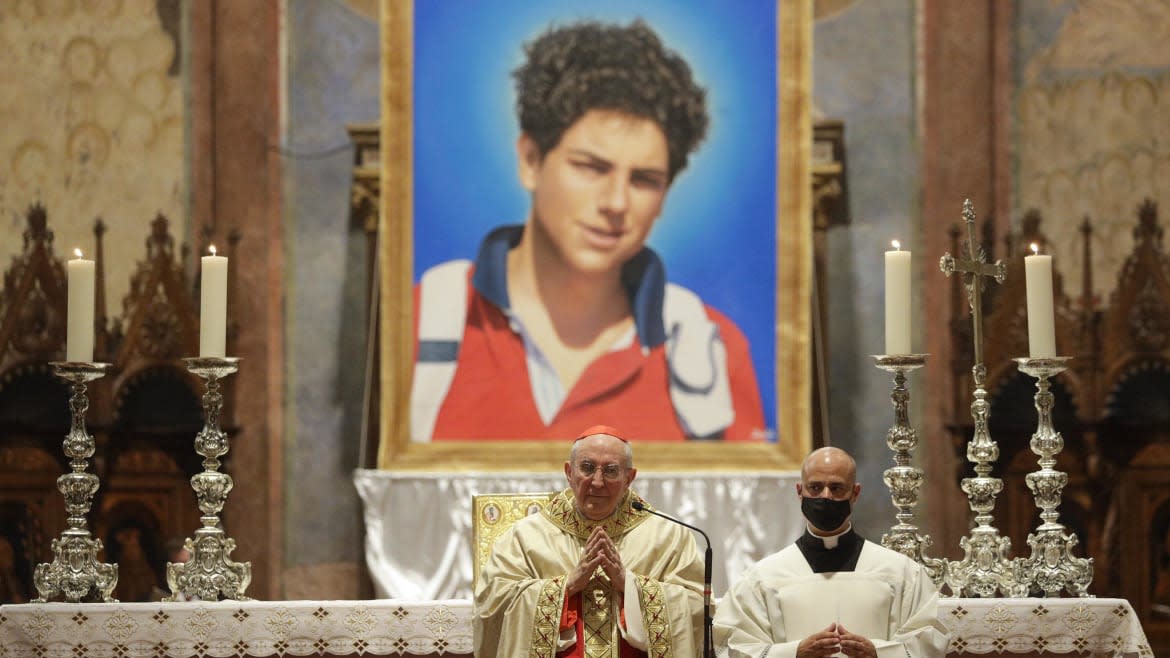Can the ‘Millennial Saint’ Make the Church Cool Again?

Millennials, the much-maligned generation derided for their love of avocados and sense of entitlement, may be about to get their first saint. Last Saturday, in the Basilica of St Francis of Assisi, technological whiz kid Carlo Acutis was beatified. The young man, who used the internet to spread his faith, died of leukemia in 2006 at the tender age of 15. Beatification is the final step before canonization, or sainthood.
Carlo was born in London in May 1991 to Italian Catholic parents but moved to Italy as an infant and spent most of his life in Milan. From a young age Carlo exhibited a great interest in technology and reportedly taught himself to code when he was very young. His mother, Antonia Salzano, described him as a “computer genius” to Vatican News. Though he was fond of Halo, Super Mario, and Pokémon, Carlo did not use the internet just “to chat or have fun” and, instead, maintained websites for local Catholic organizations and created other sites documenting appearances by the Virgin Mary and Eucharistic miracles.
In real life, Carlo was equally pious and altruistic. He attempted to say the rosary and attend mass daily and even asked his mother if he should become a priest. He was involved in charity work and, according to his mother, used his own savings to buy sleeping bags for the homeless and help those who were down on their luck. Among many other things, he volunteered at a local soup kitchen. By all accounts his behavior was utterly saintly. His mother has said that he has a natural predisposition for the sacred.
While there are some younger modern saints, he is thought to be the youngest contemporary person to be beatified and would certainly be the first millennial to be recognized as a saint by the church. His beatification was announced in June, following a formal investigation into the miraculous recovery of a 7-year-old boy in Brazil. The child had been suffering from a rare pancreatic disorder when he came across a T-shirt of Acutis and prayed to him for healing. The cure was verified by the Church as his first “miracle from heaven” in February, and his feast day is Oct. 12, the anniversary of his death. Technically, in order for him to progress to sainthood, Acutis would need a second miracle, but Pope Francis has been known to waive the requirement.
There is no denying Carlo’s piety or character, both of which will have been rigorously investigated by the Church, but it is also worth recognizing the ways in which his beatification speaks to the needs of a 21st-century denomination struggling to attract young congregants in Europe and North America. Enzo Fortunato, church spokesperson and director of the press office of the sacred Convent of Assissi, said that Acutis represents a new form of Christian evangelism; “Young people,” he said “might have been tired of a pastoral ministry that’s maybe a bit out of step with the times, despite all its efforts.”
His technological savvy and millennial skill set did not mean that Acutis fell victim to the usual temptations of scrolling the ’gram and coveting the lives of highly filtered influencers. Speaking last year, Pope Francis said that Acutis, “saw that many young people, wanting to be different, really end up being like everyone else, running after whatever the powerful set before them with the mechanisms of consumerism and distraction.” Consumerism and disengagement from the problems afflicting the world are problems that Pope Francis has repeatedly denounced since becoming Pope in 2013. But, as Cardinal Agostino Vallini said at the ceremony on Saturday, Acutis steered clear of the temptations and “used the internet in the service of the Gospel, to reach as many people as possible.”
This is not the first time that the canonization process has reflected larger political and cultural shifts in the Church. In the 15th century, as Christopher MacEvitt, a professor at Dartmouth, has written, a group of five Franciscan martyrs were canonized in order to rally Christians to the anti-Ottoman cause. In 2004 John Paul II canonized Gianna Beretta Molla, a pediatrician lauded for choosing to carry her child to term despite being diagnosed with uterine cancer. She died a week after giving birth and became an instant icon in pro-life circles. Broadly speaking, the Roman Catholic Church acknowledges the existence of many anonymous saints whose cases were never formally investigated or verified, but are recognized as saints in heaven. Molla, the Franciscans, and Acutis deserve canonization, but their recognition as such by the Church reflects both their popularity and the ecclesiastical concerns of their times.
For a Church often accused of being outdated and out-of-touch with today’s youth, Carlo represents a very modern form of Catholic piety. The marriage of tradition and technology was very much a part of the beatification ceremony on Saturday. Acutis’ heart, now a relic, was processed into the church by his parents. Relics, which may seem outdated and downright grisly to some, have been venerated by Catholics for over 1,000 years. Those looking for something more tweetable should be reassured that if and when he acquires sainthood, Carlo is likely to be the first patron saint of the internet.
Get our top stories in your inbox every day. Sign up now!
Daily Beast Membership: Beast Inside goes deeper on the stories that matter to you. Learn more.

